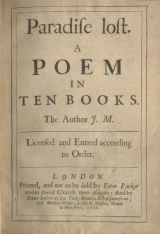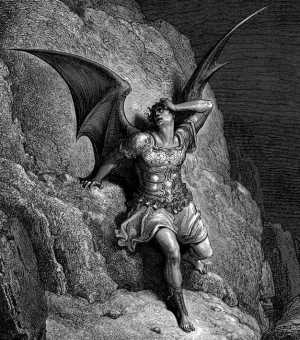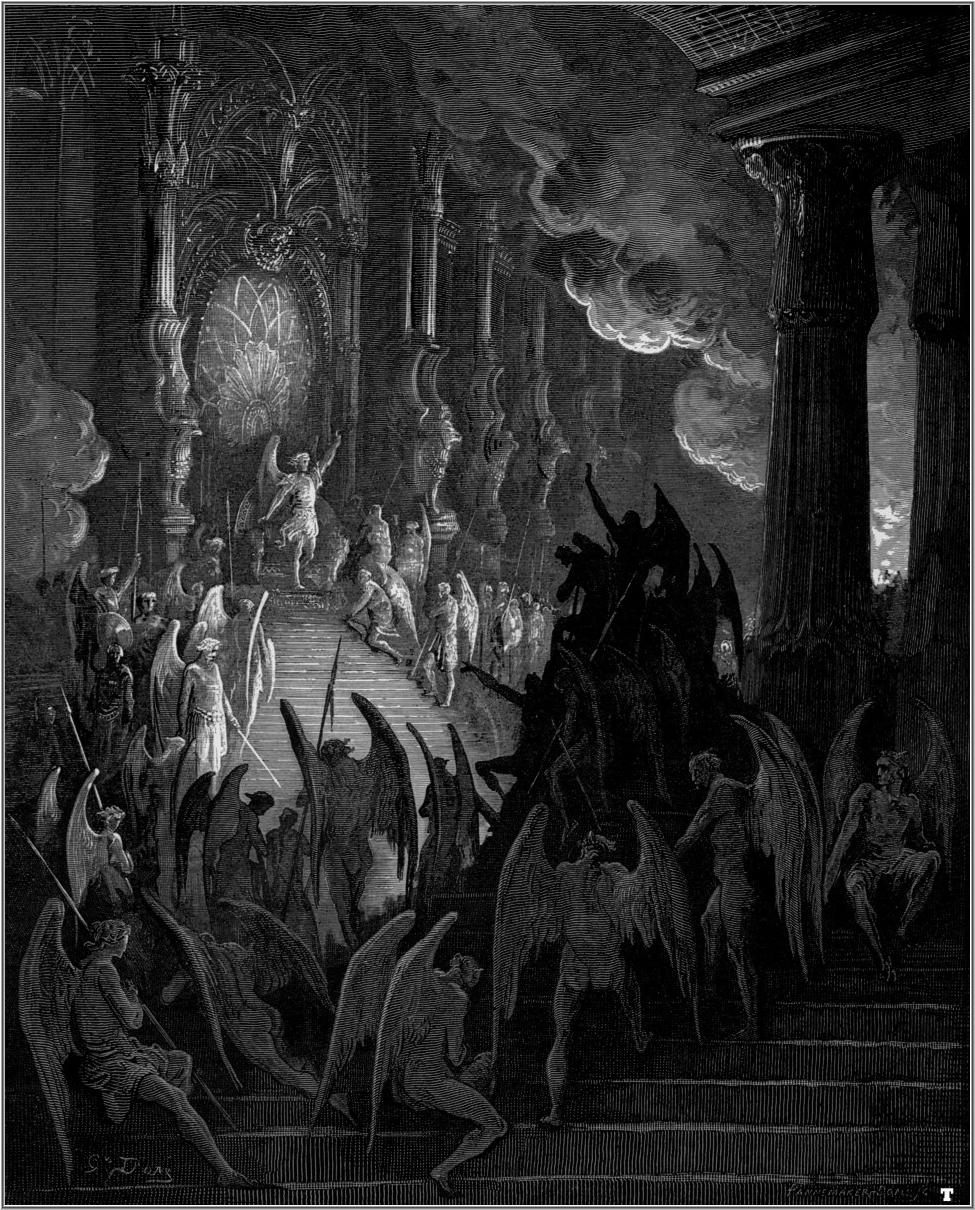Paradise Lost: John Milton’s Politics
Milton was a man who wanted nothing but the best for his nation. A prolific polemicist, Milton had many ideas about how to improve the United Kingdom during the seventeenth century. Unfortunately, his ideas of what was best for the nation became unpopular. Eventually, his position in the political sphere landed him in prison, blind and waiting for death, with the restoration of the King he had so zealously opposed. Thankfully for modern scholars, Milton managed to avoid the death sentence under King Charles II. He went on to create the most profound, inspiring and politically minded poem of early-modern England: Paradise Lost.

This epic poem was a culmination of Milton’s life. He infused the work with his ideology, his theology and his political thinking and writing, using the greatest Kingdom of all time as allegory- Heaven. God, the all-powerful monarch, and Satan, the Archdemon and orchestrator of the Fall of Man, play out the celestial tug of war over man’s soul. This created interesting insights into Milton’s views of monarchy, democracy, freedom and subjugation. Most importantly, Paradise Lost strongly reflects Milton’s political writing, in particular The Ready and Easy Way to Establish a Free Commonwealth, in its examination of the dangers of monarchy in a world of rational and free creatures.
With such a strong reflection, Milton’s ideas on monarchy are driven home in ways that provoke thought and discussion by purposefully forcing the reader to question God, to investigate the Fall of Man, and to really try to understand Satan’s motivation. Milton examined the flaws in placing faith in one being, no matter how powerful, the uselessness of monarchy and the degradation and danger presented in such a flawed system of government.
One of the most stunning points that Milton made over and over again is that monarchy is stupid. He saw it as useless, superficial and false in a nation of thinking individuals. In Ready and Easy Way, Milton said that a monarch “will have little else to do but to bestow the eating and drinking of excessive dainties, a pompous face upon the superficial actings of the state,”(p 1119). Milton thought that a monarch is simply an arrogant, shallow piece of government with no productive purpose. This idea is expounded in Paradise Lost, Book III. God gives a speech to his angels, foretelling the fall of mankind, and stating that someone must sacrifice in order to save his beloved creatures from eternal damnation. Jesus then volunteers for the dirty work. God praises Jesus, and himself for being so very clever, then abruptly “The multitude of angels with a shout/ Loud as from numbers without number, sweet/ As from blest voices, uttering joy, Heav’n rung,” (ln 345-47).
The poem then goes on for another seventy lines describing Heaven in gaudy and frivolous terms. In telling the story this way, Milton slyly provokes the reader to consider just what exactly the point of having a monarch, especially one who delegates the dangerous tasks of leadership to his underlings, and the silliness of exalting such a ruler in often times extravagant, pompous ways.
In addition to his rejection of the intelligence of a monarchy, Milton actually expressed the idea that anybody who willingly installs a monarchy over themselves is insane. Ready and Easy Way ends with the dedication “But I trust I shall have spoken persuasion to abundance of sensible and ingenuous men[…] justly and timely fearing to what a precipice of destruction the deluge of this epidemic madness would hurry us, through the general defection of a misguided and abused multitude,” (p 1136). He was placing faith, or hope, in a nation of readers that he felt had gone astray from what they naturally and rationally would choose, having been misled to support the restoration of King Charles II.

Milton, we know, was ignored, and the restoration went on despite his protestation. He was imprisoned and eventually set free, leading to the context in which he constructs Paradise Lost. It is in this poem that he illustrated the way he believed true leaders should act, and how they should be selected, through the actions and speeches of Satan in Hell. In Book I of Paradise Lost, Satan stands in the newly constructed palace, surrounded by the new republic of Hell, and says “Me though just right, and the fixed laws of Heav’n/ Did first create your leader, next, free choice,[…] Established in a safe unenvied throne/ Yielded with full consent,” (l 18-24). Satan then explains the logic behind his being chosen as leader, having the greatest share of pain and responsibility and thus the greatest share of power, as opposed to Heaven, where God is left to be thought of as ruling without the consent of his subjects, shoving the hard work and sacrifice off to others.
Milton presents Hell as a persecuted yet far more rational, intelligent place than Heaven when, in Satan’s speech, he writes “With this advantage then/ To union, and firm faith, and firm accord,/ More than can be in Heav’n,” (l 35-37). This representation of Satan speaking to the demons of Hell is important. Cast into eternal torment for their actions against what they viewed as tyranny, the reader is forced to consider the question of how and why a leader is put into power. Milton is asking the reader ‘what is better, a powerful ruler demanding loyalty, or a loyal ruler given power?’
With such attributes as stupidity and insanity representing Milton’s views of those who support monarchy, it is not surprising to find that a major source of his opposition is that Milton found living under a monarch to be degrading. The degradation of a people is intrinsic to having a king, as stated in Ready and Easy Way on page 1119 when Milton describes that a monarch has little to do but “…pageant himself up and down in progress among the perpetual bowings and cringings of an abject people, on either side deifying and adoring him for nothing done that can deserve it.” It has already been established that Milton found monarchs useless, but now he asserts that a monarch by nature results in an unpleasant and demeaning situation for the people being ruled.

In Paradise Lost, Milton was able to bring this idea to mind in a way that causes some second-guessing of the nature and adoration of monarchy. In Book IV, lines 947 through 967, Gabriel confronts Satan. Gabriel condemns Satan in lines 957 through 960, saying ” ‘…thou sly hypocrite, who now wouldst seem/ Patron of liberty, who more than thou/ Once fawned, and cringed, and servilely adored/ Heav’n’s awful Monarch?'” This scene in Paradise Lost is very interesting because it can be read in many ways. On one hand, Gabriel could be mocking Satan by repeating Satan’s own view of “cringing” and adoring servility in Heaven, angry at Satan because of his rebellion. This view would allow little power to this section and simply be an iteration of how very bad Satan is. On the other hand, this could be reflective of Gabriel the Archangel’s own internal thoughts and emotions.
With so much commentary on the negative aspects of monarchy, the text better supports the idea that this scene reflects Gabriel’s own inner thoughts and emotions, showing a negative view of the Kingdom of Heaven from one who fought to protect it. This contradiction of emotion and action is one source of Gabriel’s anger in his speech to Satan, playing off of the humiliation of Gabriel for his position within God’s kingdom as well as the failure of Satan’s revolt. Milton drew out exactly the emotional state he believes England to be in after the restoration- that of subjugation and fiery adherence to an emotionally abrasive position of servility.
Decidedly, it is safe to say that Milton disliked the reformation. His political essay The Ready and Easy Way to Establish a Free Commonwealth was his immediate reaction to the growing opinion for reinstating the monarchy. Eventually, after failing to convince England that this was a mistake and suffering the ensuing imprisonment, he came to reiterate his political ideas and philosophies through the epic poem Paradise Lost. The connections that can be made between these works bring out Milton’s ideas in a thought-provoking and inspirational way.
The most interestingly examined ideas are his doubts as to the intelligence and sanity of those who would install a monarch as their ruler, as well as the degrading position this puts them in. By using Satan as the protagonist of his ideas he automatically prejudices people against the ideas being explored. This strange flip of characters, with Satan being the hero of the story and God the “awful Monarch,” allows for a full exploration and expression of Milton’s views while forcing the reader to think critically of everything being said and done.
Milton wanted England to realize what a monarchy truly means and to answer for the decision they made, if not to him, then to themselves, in perhaps the most elaborate, inspiring and beautiful ‘I Told You So’ in all of early modern England.

Work Cited
1. Kerrigan, William, John Rumrich, and Stephne M. Fallon. “The Complete Poetry and Essential Prose of John Milton.” New Your: Modern Library, 2007. Print
What do you think? Leave a comment.











Your are writing about a book which I cherish my friend. I can’t even put what I feel about this book into words. It’s just so remarkable. Everyone who reads this book loves it. This book is by far the greatest book I’ve ever read.
Thank you Vincent! I have another article in mind of a study on Milton’s Eve in Paradise Lost, which I will get up here if enough people seem interested.
Milton is easily one of my favorite authors- his intelligence and philosophy are both so potent in his work, it is hard not to get all riled up about it (even if one disagrees with his views)!
Absolutely. This is a very difficult book to read but well worth it. It really takes two readings to get the most out of this book because it requires the reader to work through several chapters before becoming accustomed to the style of writing. However, the insight into God, Jesus, Angels, Satan and Mankind is very powerful. Wow! What a view of creation and salvation.
Great study. Milton’s choice of words is what makes Paradise Lost a beautiful piece of literature. It is very complex, for me I had to read it over and over again to fully understand it all.
Absolutely. I think even the greatest scholars will learn something new every time they go back to it. Everything from tiny nuggets of historical facts to a small twist of the understanding of a word or phrase can completely rearrange the poem!
If you like this article, comment and let me know! If you are interested in another study of Paradise Lost, exploring the character and role of Eve within the poem, let me know in your comments and I will get it up!
Thanks, but no, thanks.
Words cannot describe how amazing this article is.
Very strong piece. My colleagues at University will find this article of interest. Milton’s masterpiece is certainly one of discussion and reflection.
Thank you Shaunna! Please share this article! I am very grateful for your response. 🙂
This was amazingly written, NICE.
This article is amazingly written. I am fortunate enough to know the man who wrote this. Great job keep up the good work.
As an analysis, I liked this piece. I recently had the privilege of speaking with a professor who specializes in Milton studies. We didn’t discuss politics much, because it seemed that Milton was more trying to put his theological beliefs onto others. When it comes to monarchism there are 2 competing entities: God and Satan. If one truly reads how Satan rationalizes to his conclusions, he is flawed in his logic. It is interesting to think that the entity which is most like humankind and is the focus of the epic in the beginning is also the one who is most flawed in logic. God however does not seem to be lacking. It would also be interesting to see how one rationalizes the differences in relationships with God and Son and God and Satan before the Fall.
I am very glad for this comment! There are a few instances where we actually catch Milton’s God saying things that are flat out not true- so he either lies or does not know some things. I am at work right now, but I will bring the exact line numbers and my reasoning in an additional post on your comment when I get home. Thank you!
One word intense
Amazing!!!! Sdsu doing you good son!! Looking forward to more!
Nicely written and very interesting!!
Thanks for your interesting blog. It’s a good take on Blake’s dictum that ‘The reason Milton wrote in fetters when he wrote of Angels and God, and at liberty when of Devils and Hell, is because he was a true Poet and of the Devil’s party without knowing it’.
With reference though to “With this advantage then/ To union, and firm faith, and firm accord,/ More than can be in Heav’n,” (l 35-37) (The reference by the way is Book 2 , not Book 1), I don’t think the purpose of these lines is as you suggest. Satan’s point is that he does not fear rebellion from his inferiors because they know he will shield them by taking the brunt of God’s retaliation if the devils assault Heaven. The devils’ strength is being united in fear. In Heaven their previous status ‘might draw envy from each inferior’ but here in Hell ‘Where there is then no good
For which to strive, no strife can grow up there
From Faction’
You are absolutely right about the quote being from Book 2! I did not make that distinction, sorry! I appreciate your views on this, and in my opinion that is one of the best things about poetry- the many interpretations of it! If you would like to discuss these ideas further I would definitely be willing. Thank you for your post!
Yes I’m certainly keen on pursuing understanding of what Milton intended when writing his epic poem and debating any number of points.
Of particular interest to me is Milton’s approach to knowledge. I’m writing a screenplay premised on an encounter he had with Galileo which changed his life,
http://johnmiltonslifedramatised.blogspot.co.uk/ (where you can see a link also to this blog!).
I see Paradise Lost partly as a playground of ideas where the poet is weighing up the virtue of acquiring knowledge against the danger of unbridled inquisitiveness. This is worth looking at
https://www.dartmouth.edu/~milton/reading_room/pl/intro/text.shtml
and here is a resource that I am yet to mine fully.
http://www.paradiselost.org/
I look forward to comparing notes with you further!
Peter
Milton wrote two interesting pamphlets on the same subject you discuss here. ‘The Tenure of Kings and Magistrates’ of 1649 promotes republicanism and a commonwealth government. He also published ‘Eikonoklastes’ in 1649, which argued for the execution of Charles I. Throughout his work, Milton corresponds monarchical rule to satanic rule on earth. Since these pamphlets predate ‘Paradise’ by almost two decades, Milton certainly had some time to consider their principles in more poetic ways than he had previously.
Nice read. Thanks for the post.
You propose an interesting argument by placing Paradise Lost in a political framework that reflects Milton’s views on the monarchy. However, I think ultimately that your reading of the epic undermines the more penetrating religious truths Milton was trying to communicate. Satan could equally be understood as a dramatic character whose real tragedy is succumbing to his own fallacious reasoning: his is a a sophist of sorts whose pride blinds him of his most condemning faults, and whose sinuous logic allows him to justify himself against the wisdom of God. True, the good angels themselves don’t always see through Satan’s rouse, who appears to have retained his intelligence even after his fall; yet their own shortcomings are, in my opinion, more of an expression of the inferiority of all created wisdom compared to God’s omnipotence, rather than a satirical web of monarchical criticism. Nevertheless, I appreciate your presentation of a position that is not without merit, and ought to be considered. Paradise is an incredibly rich and multi-layered text, without doubt.
Very well written.
I love reading articles on Paradise Lost through the lens of political turmoil in 17th century England, and you did a great job with that. I wish you had put compared Paradise Lost a little bit more with Areopagitica and how their views on people must actively struggle to secure liberty. Doing so also would have given you a great opportunity to put Paradise Lost in the context of its related works, Paradise Regained and Samson Agonistes, which I’d like to see done
First of all, great article! Very well written and convincing. I ultimately disagree with you but I think I might write an article in response to this one (thanks for the inspiration!), since the comment section isn’t really long enough.
Nonethless, I have one question. Why do you think Milton refers to Satan as “Emperor” giving commands in Book 10 line 429 and 430 if he’s a supposedly a quasi-republican hero?
I think that often the casual reader only sees the religious thematic elements of PL without taking into consideration Milton’s very strong political beliefs. This is a nice article that gives a good entry way into this vain of thought. I just read an interesting article that explored the use of Machiavellian elements in PL that Milton uses to argue against a monarchy. Again, nice article on a topic that is just sometimes to vast to easily sum up.
I love your article! Paradise Lost has been near and dear to my heart since discussing Milton when I was in England. I also have to say, props for your final sentence. It’s always struck me how sympathetic Satan is at first. Milton truly was a genius. Excellent piece – I didn’t want it to end!
Just read Paradise Lost and after I read some Paradise Lost essays because I want to write a book report/review on it. Then found your post, thanks for sharing R.A.!
in what way is this epic representative of its age ??
how is it related to it’s age ??? in what way?
Refreshing departure from the Christian interpretation. This aligns Miltons political views with PL in a way I haven’t heard before.